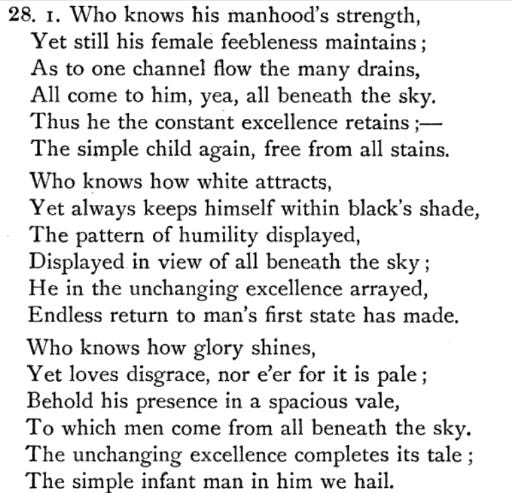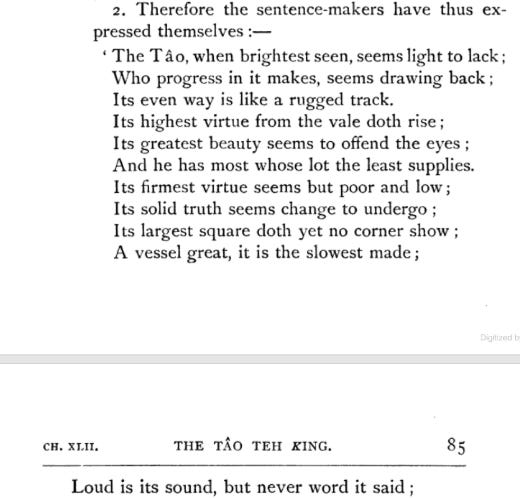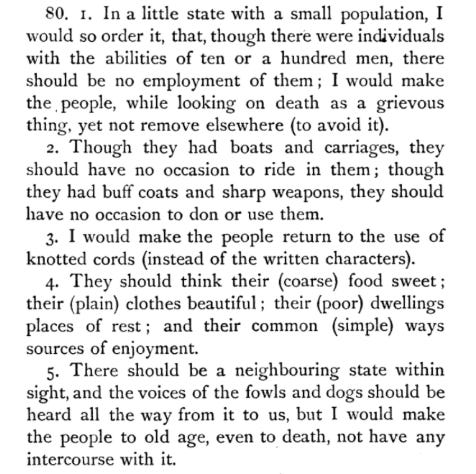Reading the blog of Victor Mair, I noticed Mair’s respect for James Legge’s translations of the Chinese classics into English (especially over Giles’s translations), which Mair recommends even over most translations into modern standard Mandarin and some newer translations into English (though presumably not his own). Thus, for some reason I do not know, I decided to read Legge’s translation of the Dao De Jing, a pre-Han Chinese religious text. Comparing it to a newer attempt at a no-charge translation of the Dao De Jing, I have seen no reason to doubt the accuracy of Legge’s translation even in the rhymed portions (and I do not support making translations rhyme).
I have to say it is the worst religious work I have ever read. The text consists of a difficult and highly repetitive mix of Rousseau, Orwell’s 1984, and portions of the Gospels. Contrary to many claims, it is not obviously libertarian or even anarchistic, but it is highly supportive of both personal and governmental austerity. As Legge says, “The Tâoist proclivities of the founder of the Khin dynasty are well known.”. That dynasty was as far from libertarian as one could think.
Here are some selected quotes from the text.
The above quote is similar to Rousseau’s Discourse on the Sciences and Arts, in which, interestingly enough, he condemns the China of his day for being too obsessed with the sciences and arts - “there is no vice that does not dominate them, no crimes with which they are not familiar… what purpose did all its learned men serve? What benefit has resulted from the honors bestowed on them?”.
There is some similarity here with the synoptic gospels. It is notable that though Christianity in Europe was only one religion, in China, aspects of it were split into three and were never fully fused -Daoism resembling Jesus’s sayings, Buddhism resembling Christian doctrine, and Confucianism resembling Christian institutions (though I may be in error here, as I do not know much about either Buddhism or Confucianism).
As Orwell wrote in 1984,
War is Peace
Freedom is Slavery
Ignorance is Strength
There is a clear similarity here to the aversion to enlightenment of the common people found in 1984. It is quite remarkable that a religion so openly averse to evangelism spread at all, and especially that it became popular enough that copies of it were found in ancient tombs.
This is clear support of a government’s neglect of the populace -but, as the below quotation suggests, it is probably a malign neglect, rather than a benign one imagined by some libertarians.
Overall, the text was an annoying and dreary read.
Instead of reading the Dao De Jing, I suggest just reading the Gospels/Rousseau’s First and Second Discourses/Orwell’s 1984. Given the popularity of the text in ancient and medieval China, it must have appealed to a certain type of postural bicameral, most likely the one (as in Orwell’s 1984) that could touch his toes.










I picked up a copy of Li-Young Lee's translation, but haven't read much of it yet. Near the end of "chapter 4", it says, "The first cause, it seems the progenitor of God." (page 9). Is "God" accurate? I only took a semester of Mandarin back in Fall-2013. This edition has the Chinese on the left page with the English on the right. In the introduction it has the Perennialist bullshit about how all religions, East and West, are the same (p.xiii). That's something that turned me off of most English translations of the Bhagavad Gita. In the translators notes it says,
"We may never truly know who authored Dae De Jing, although it seems strange to us that Dao De Jing would have been attributed to Laozi is the book were not written by him, dictated by him, or based on his teachings."
The last option is definitely not the same as the first two: Hebrews is def. Pauline but no credible scholar thinks Paul wrote it, or dictated it. The translators further say "we have been able to comprehend it as a unified whole." However, the only way to truly rule out any redactors of any ancient text is to compare MSS, and I'm assuming that is a lot harder to do with the Dao De Jing than with the Bible.....
I seriously recommend S.Mitchell's translation as well as an English commentary, and maybe some academic articles on it. Maybe visit a Daoist temple in China? Don't give up on it after just one read. I would also love to see you review Manu Smriti (but don't use Wendy Doniger's translation, she's a bit antique).